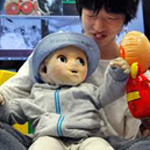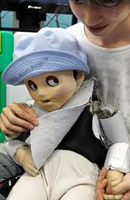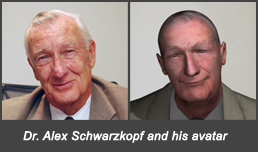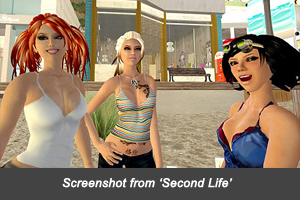 Cyber-hugs and robot babies - a brave new world
Cyber-hugs and robot babies - a brave new world
29th June 2010
Artificial! Synthetic! Virtual! These are the buzz words of the new millennium, buzz words that describe the brave new world it seems we cannot wait to reach. Every week there are blazing new technological developments towards this end. It seems that even over the past year the momentum has gathered blistering speed. We are all too happy for the natural to be replaced by the artificial. 'Sim card man' is truly on the horizon.
This week there are reports that a Tokyo University team has developed a robot designed to simulate the development and behaviour of a nine-month-old baby in an effort to better understand how humans grow. Creating a robot which can develop cognition in a way that a human baby does during its growth process should also help in achieving a society where robots and humans can live side by side, says Professor Kuniyoshi. "Our purpose is to build a system that can learn various behaviours and acquire various functionalities as it explores around the environment and interacting with humans," 1 he said.
Noby is a highly accurate model with the sensory and motor functions of a nine-month-old human baby. The body is covered in a soft "skin" with 600 tactile sensors. It is flexible and its joints can move like those of a human baby.
 Noby also has two cameras for "seeing" and two microphones for "listening to" the external world. The project is also part of attempts to make more human-like robots. Professor Kuniyoshi's team chose a nine-month-old human baby as Noby's model as this is the time of rapid development of movement and cognition functions.
Noby also has two cameras for "seeing" and two microphones for "listening to" the external world. The project is also part of attempts to make more human-like robots. Professor Kuniyoshi's team chose a nine-month-old human baby as Noby's model as this is the time of rapid development of movement and cognition functions.
There are two remarkable assumptions behind this experiment. First it is assumed that human beings will interact with a robot as they would with another human being and provide the robot with the same inputs that would reach a human baby. Second it is assumed that the development, behaviour and cognition of a human baby can be replicated if the same external signals that are received by a human baby are programmed into a robot. Is there a certain something that is being missed here, an ingredient that is non-programmable? What do you think?
It all reminds me of the special jackets were designed some years ago in Japan for children who are away from their parents. The idea was that if the child wears the jacket the parent can give him or her remote 'cyber-hugs' through it. If this makes you squirm then ask yourself why? If you feel something is missing from a 'cyber-hug' what could that something be?
 In a recent New Scientist article entitled "Immortal avatars: Back up your brain, never die" 2 Linda Geddes reports the first steps towards creating digital avatars that are to all intents and purposes clones of their human sponsors. Huge amounts of information are programmed by an individual into a 'mind file' that will form the avatar's data, likes, dislikes and mannerisms. A representative from an organization funding research into such avatars says: "If you spent an hour a day answering questions, it would take five years to complete them all, but the further you go, the more accurate a representation of yourself the mind file will become." She goes on to say that: "Ultimately, however, they aim to create a personalized, conscious avatar embodied in a robot - effectively enabling you, or some semblance of you, to achieve immortality." "If you can upload yourself into this digital form, it could live forever," says Nick Mayer of Lifenaut, a US company that is exploring ways to build lifelike avatars. "It really is a way of avoiding death."
In a recent New Scientist article entitled "Immortal avatars: Back up your brain, never die" 2 Linda Geddes reports the first steps towards creating digital avatars that are to all intents and purposes clones of their human sponsors. Huge amounts of information are programmed by an individual into a 'mind file' that will form the avatar's data, likes, dislikes and mannerisms. A representative from an organization funding research into such avatars says: "If you spent an hour a day answering questions, it would take five years to complete them all, but the further you go, the more accurate a representation of yourself the mind file will become." She goes on to say that: "Ultimately, however, they aim to create a personalized, conscious avatar embodied in a robot - effectively enabling you, or some semblance of you, to achieve immortality." "If you can upload yourself into this digital form, it could live forever," says Nick Mayer of Lifenaut, a US company that is exploring ways to build lifelike avatars. "It really is a way of avoiding death."
Would you be happy with that kind of eternal life? Would uploading who you are as a human being into a robotic avatar give you a sense of a future scope and existence after your body dies? Would that robot to all intents and purposes be you? If you feel comfortable and somewhat hopeful about living on in this way cyber-hugs and robot babies should be no problem for you also.
 "Second Life," an online game offering life in a virtual world has acquired five million subscribers in just five years. Michio Kaku envisages that "by 2020 there will be an entire 3D universe in cyberspace with virtual countries and governments, virtual schools and universities, virtual properties and stock markets and virtual families and friends. Virtual reality is going to be more and more like real reality. Already more than 20 million people worldwide spend an average of 20 hours a week in virtual worlds and some actually prefer virtual communication to socialising in the real world." 3 Well if it makes them happy why not?
"Second Life," an online game offering life in a virtual world has acquired five million subscribers in just five years. Michio Kaku envisages that "by 2020 there will be an entire 3D universe in cyberspace with virtual countries and governments, virtual schools and universities, virtual properties and stock markets and virtual families and friends. Virtual reality is going to be more and more like real reality. Already more than 20 million people worldwide spend an average of 20 hours a week in virtual worlds and some actually prefer virtual communication to socialising in the real world." 3 Well if it makes them happy why not?
Why not indeed? Are you feeling a gathering sense of unease about all of this? Are the hairs on the back of your neck standing on end as mine are as I envisage the future that lies in wait for my children? If such is the case then somewhere inside you, you are sensing that there is something about natural humanity that cannot be digitally mastered and reproduced. If there is such a something then there must be an ingredient that is not formed of purely physical elements. Anything physical is potentially reproducible with the right technology.
In my books I suggest that the Grey aliens reported by so many reliable witnesses may well be the final product of a civilization that sought to avoid death with the same kind of technological developments I have just been describing. Could these entities be the epitome of artificial intelligence? Abductees have commented on their blank, emotionless faces as they carry out painful procedures on their human subjects many of which are centred on the reproductive system. The impression is that we are laboratory rats to them. They seem incapable of any emotion be it compassion and sympathy at one end of the scale or cruelty at the other. As such they cannot, it seems, be understood in anthropomorphic terms. From all accounts they are more like programmed machines, biological robots perhaps programmed to preserve the identity of their creators for eternity. This identity could be preserved in more than just a 'mind file' or avatar format. These entities could carry the DNA of their creators and clone it and re-clone it in an attempt to reconstruct the original genetic programme. They may have been designed with a view to space travel in order to find new fresh sources of DNA elsewhere in the universe to refresh their cloning process.
Scientists in the US have just succeeded in developing the first living cell to be controlled entirely by synthetic DNA. The researchers copied an existing bacterial genome. They sequenced its genetic code and then used 'synthesis machines' to chemically construct a copy. They copied this code and chemically constructed a new synthetic chromosome, piecing together blocks of DNA which they then transplanted it into a host cell. The resulting microbe then looked and behaved like the species 'dictated' by the synthetic DNA. The advance, published in Science, has been hailed as a scientific landmark, but critics say there are dangers posed by synthetic organisms.
Dr Venter (one of the researchers) told BBC News: 'We've now been able to take our synthetic chromosome and transplant it into a recipient cell - a different organism. As soon as this new software goes into the cell, the cell reads [it] and converts into the species specified in that genetic code.' 4
The new bacteria replicated over a billion times, producing copies that contained and were controlled by the constructed, synthetic DNA. Could the Greys themselves be created by an advanced technology using synthetic DNA. Could our hurtling progress towards technologies such as these mean that we are soon to produce our own type of Grey? Artificial DNA could be modelled on our own DNA pattern and modulated to cope more efficiently with the effects of a physical environment.
The implantation of chips in the human body is gaining acceptance, be it for the enhancement of intelligence or memory or as a type of medical alert bracelet implanted in the hand or wrist so that if you're found unconscious you can be scanned and your medical history brought up.
Dr Mark Gasson from the University of Reading had a chip inserted in his hand which was then infected with a virus. The device, which enabled him to pass through security doors and activate his mobile phone was able to pass on the computer virus to external control systems. If other implanted chips had then connected to the system they too would have been corrupted, he said.
Professor Rafael Capurro of the Steinbeis-Transfer-Institute of Information Ethics in Germany warned that "if someone can get online access to your implant, it could be serious." However, Dr Gasson believes that there will be a demand for these non-essential applications, much as people pay for cosmetic surgery."If we can find a way of enhancing someone's memory or their IQ then there's a real possibility that people will choose to have this kind of invasive procedure." 5
By all accounts the Grey aliens featured in thousands of abduction reports are obsessed with our reproductive capacity. That they are conducting a hybrid program with humanity has been extensively reported and according to Professor David Jacobs and Budd Hopkins, (the world's leading researchers into the alien abduction premise), that the hybrid program has been stepped up many-fold over the last twenty years. To quote Professor Jacobs: "All of these accounts, to put it bluntly, point to a future in which human-looking hybrids will be here amongst us. The evidence is now so strong I can no longer look at alternative motivations for them. Everything I have learned about this subject in the past 20 years inexorably points to this conclusion. I cannot escape it." 6 It is interesting to note that the past twenty years has also seen exponentially greater developments in bio-technology and artificial intelligence than any other time period. Could these developments and the hybrid programme be inextricably linked?
The DNA reference of the original creators of the Greys is long since likely to have broken down through the dispersive effect of the Second Law of Thermodynamics. So are they now seeking to refresh that reference through our DNA on our planet or the DNA of any sophisticated enough natural species they could find in the galaxy? Are they slowly and carefully melding their patterns into ours so that the two can be a viable match and their genetic programme can be reproduced? Just as our scientists copy the pattern of bacterial DNA are the Greys copying our pattern to create synthetic bio-mechanical entities like themselves. In doing so they would be simply following their programme to survive in as advantageous a form as possible in a physical universe. But what if we do have that extra something that is not of that physical universe, that same something that may have made you cringe when I spoke of robot babies and cyber-hugs, could they be interfering with that something? Could they be compromising a natural connection to a non-physical state beyond the physical universe? Could that connection which some might term a 'soul' be interrupted and delayed by artificial insertions that compromise its ability to translate the non-physical into the physical? Is this the price we pay for embracing the artificial, the synthetic and the virtual – the loss of the natural and the real?
I don't wish to seem didactic or preach new meanings to anyone. But a mighty threshold is creeping up on us all. Particularly those of us in developed societies. A threshold that it seems we lose sight of all too often because it creeps up on us inexorably in our everydayness. That threshold is a sight of the importance of the distinction between the natural living aegis of our human condition and that of an artificially created one. The size, range, and potential of the human spirit in its natural harbour to soar to limitless horizons beyond the empirically definable is losing definition. The tendency to run with the impetus that science brings dominates our everyday lives and we deny ourselves those grand and inspiring perspectives that reach beyond the mundane and the ordinary. We only get rare glimpses of our true natural potential and these get rarer and rarer as we become more and more hitched up to the artificial reality that is thrown at us. How many cyber-hugs would add up to one real one? How many hours of virtual reality will add up to one moment of actual reality? Why is it that we are rarely if ever tempted to ask those questions these days?
1 news.uk.msn.com/world/articles
2 Immortal avatars: Back up your brain, never die (07 June 2010 by Linda Geddes, Magazine issue 2763)
3 'Visions of the Future' – 'The Intelligence Revolution' (November 2007) BBC 4
4 news.bbc.co.uk
5 news.bbc.co.uk
6 David M. Jacobs, "A Picture We May Not Wish to Gaze Upon," Journal of Abduction Encounters Research